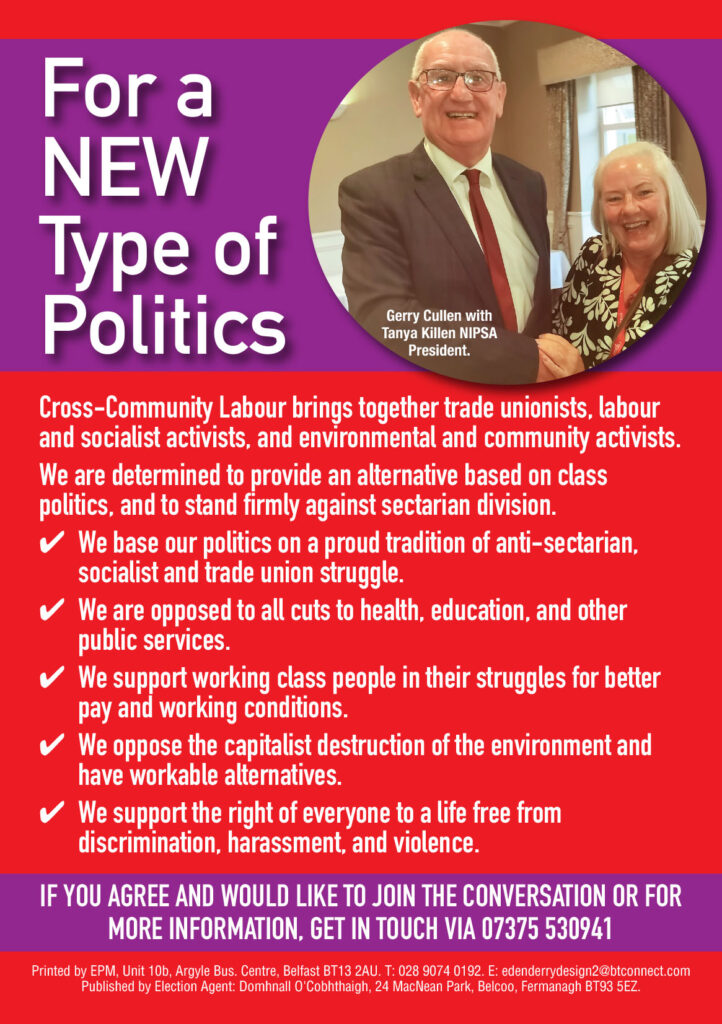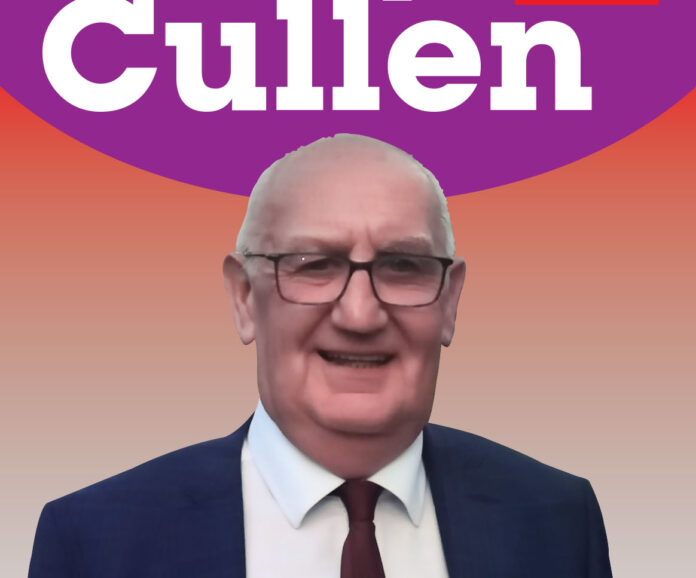Workers’ Candidate stands in Fermanagh and South Tyrone
The outcome of the UK General Election will be decided in a battle between the Labour Party and the Conservative Party in England, Scotland and Wales. Neither party will win any seats in Northern Ireland. The Labour Party-certain to win after 14 years of austerity and government chaos-has members in Northern Ireland but does not contest elections. The Conservatives are standing but without enthusiastic central party backing and will make little impact.
The election instead will be dominated by five parties, four of which are based on sectarian division. The Democratic Unionist Party is the largest unionist party though it faces competition from the smaller Ulster Unionist Party for one of its eight seats (South Antrim). Sinn Fein has seven seats and is the largest nationalist party. The Social Democratic and Labour Party goes into the election holding two seats. It had a good election in 2019, in part because Sinn Fein’s policy of not attending the UK Parliament allows it to win voters who would normally vote Sinn Fein.
The fifth party is the Alliance Party, which wins votes in both communities and is hoping to add to its outgoing single seat. Part of the Alliance vote is a genuine rejection of sectarian politics, but it also benefits from a Catholics voting to keep out unionist candidates, or Protestants voting to keep out nationalist candidates, depending on the constituency.
Alliance is a pro-capitalist party with right-wing economic policies. It is not a real alternative for young people and workers looking for a way forward. And unfortunately, in this election, despite the prominence of class issues, there is no credible alternative for most workers at the ballot box. There is one exception: in Fermanagh and South Tyrone where Cross-Community Labour Alternative (CCLA) are standing. Cross-Community Labour is an umbrella group bringing together trade union, labour and socialist activists, and environmental and community campaigners.
The Anti-Sectarian Left Tradition
There is a strong anti-sectarian left tradition everywhere in Northern Ireland, including in the Fermanagh and Tyrone constituency. Cross-community socialists have previously won council seats in both Enniskillen and Dungannon, the two main towns in the constituency.
Davy Kettyles held a council seat in Enniskillen in the 1980s and 1990s standing first for the Workers Party and later as a Progressive Socialist. More recently Donal O’Cofaigh won a seat in the 2019 election for Cross-Community Labour.
Jack Hassard, a Protestant working-class activist, was the voice of opposition to both unionism and nationalism on Dungannon Urban Council in the 1960’s, 1970s and early 1980s as a Northern Ireland Labour Party councillor. The CCLA candidate in this election, Gerry Cullen was elected to Dungannon District Council on three occasions in the 1990s standing on labour and socialist principles, initially for the Workers Party and later as an independent socialist. He lost on his fourth outing on his highest ever vote due to the vagaries of the transferable vote system.
As an elected representative he stood up for the Irish Traveller community when it was extremely difficult to do so, campaigning for clean water and toilet facilities on their sites. On one occasion he sat with the Travellers in their caravans to prevent evictions by the police.
He raised the issue of domestic violence and successfully fought for the provision of safe refuge space for women and children in the 1990s and proposed the establishment of a Disabled Access Committee and successfully campaigned to make Dungannon Town Centre friendly and accessible for disabled users.
Recently he has led a campaign to defend the personal and professional reputation of nurses and care workers and has been a very vocal advocate for the protection of Care Home residents and families’ rights.
A Patient and Consistent Approach
It is important to provide working class people with a consistent alternative, and Gerry’s campaign is not a one-off: Cross-Community Labour has stood in six of the last seven elections in Fermanagh and South Tyrone.
Donal O’Cofaigh stood in the Assembly elections in 2017 and 2022 and in the Local Elections in 2019 and 2023. After Donal won a seat in 2019 he was a voice for working class people and a thorn in the side of both nationalism and unionism. He lost his seat in 2023 in an election which saw candidates outside the big parties squeezed everywhere but has continued to campaign and struggle every day since. Gerry Cullen also stood as a council candidate in Dungannon Town for CCLA in the 2023 Local Elections and gained a very credible vote against the electoral tide.
Caroline Wheeler stood as an independent candidate in the 2019 General Election, backed by both the Labour Party in Northern Ireland and CCLA. She won an impressive 751 votes in a highly contested and sharply sectarian election. She was the only anti-sectarian left candidate anywhere in the North in the 2019 election. If 18 candidates with a track record, local profile, and a serious campaign had stood there could have been 10,000 votes for a real alternative across Northern Ireland.
There is Real Potential
There is hard evidence that a broad political project could in time attract members and a good vote. There are a quarter of a million trade unionists in Northern Ireland. Of these 150,000 belong to unions which offer members the opportunity to pay into a “political fund”. This is an option-it is easy to say no-but yet 37,000 “opt in” most in full knowledge that their payment helps to fund the Labour Party. Many of these 37,000 would be sympathetic to a new left project in the North which contests elections.
NIPSA, the largest union in Northern Ireland has no political fund. Just over 50% of delegates voted in favour of a membership ballot to endorse the creation of a political fund at its annual conference in late May. If this step was taken it would start a journey which could end with the union endorse candidates in elections. Many of the delegates who voted for the motion are sympathetic to the idea of a new left project.
When Jeremy Corbyn became leader of the LP in 2015 membership in the North grew rapidly from 500 to over 3000. Today membership has fallen back but it remains higher than before the Corbyn years. The 3000 who flooded into Labour were attracted to the left message encapsulated by the slogan “for the many not the few”. Many must still be looking for a real alternative.
Several years ago, the Labour Party commissioned LucidTalk to conduct a poll which demonstrated solid support for Labour politics in Northern Ireland. Six per cent of respondents said they would give Labour party candidates (if Labour ever stood) a first preference vote. A further thirty-two per cent said they would give Labour candidates a second or lower preference.
A third of the electorate do not vote. Up to 15% vote for Alliance or the Greens in each election, and some of these are looking for a left alternative. There is an untapped reservoir of support for genuine labour and socialist candidates standing on a clear cross-community ticket.
Showing the Way
The next Assembly (devolved government) election will be in May 2026 and the next local elections in May 2027. May 2026 may sound far away but when the dust settles on the General Election results and parliament sits in September there will only be 18 months for activists to come together, decide to stand and to start preparing.
CCLA intends to contest every election in Fermanagh and South Tyrone and to work with activists across the other 17 constituencies to ensure all workers and young people have a real alternative on the ballot paper in the future. There is no reason why activists in the other constituencies could not come together and form genuine coalitions. If each group were to build carefully and patiently, a base can be created, drawing in new activists thrown up by new struggles. A good campaign in this election will help to show the way.




